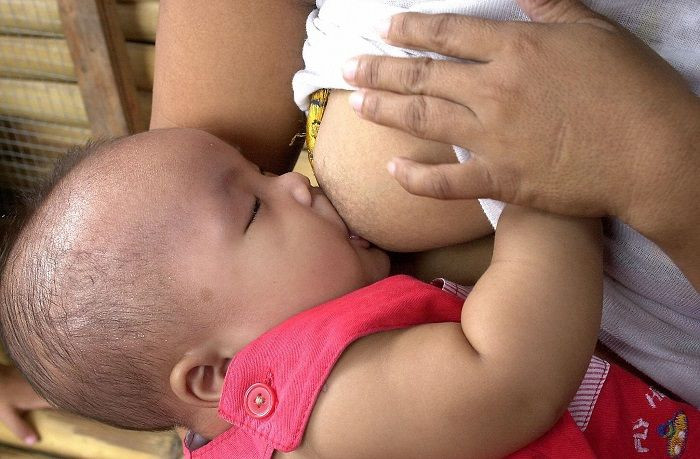Moms Who Breastfeed For Six Months And Have Healthy BMI May Protect Children From Fatty Liver Disease In Their Teens

Breastfeeding has been linked to many health benefits in infants — a tally which may now include a reduced risk of developing non-alcoholic fatty liver disease in adolescence, according to research presented at the International Liver Congress 2016 in Spain this week.
The researchers found that breastfeeding for at least six months reduced the risk of an infant developing non-alcoholic fatty liver disease in adolescence by a third compared to those who were fed less than six months. In addition to breastfeeding, Australian researchers found that pre-pregnancy BMI (body mass index), a measure of body fat and general health, also was linked to a child’s risk of developing the disease. Mothers whose BMI fell within a normal range — between 18.5 and 24.9 — reduced an infant’s risk of developing the liver disease by a half compared to those whose mothers didn't.
Gastroenterologist Dr. Brian J. DeBosch told Medical Daily that the findings are in tune with previous studies that have observed a link between a mother’s metabolic health and the health outcomes of their children, including the development of diabetes, metabolic syndrome, obesity and non-alcoholic fatty liver disease. DeBosch was not involved in the study.
Non-alcoholic fatty liver disease is a growing public health concern, affecting up to 25 percent of people living in the U.S., according to the American Liver Foundation. What’s more, the prevalence of the disease, marked by the buildup of extra fat in liver cells, is rising in adolescents and children. In fact, recent studies claim it has become the most common liver disease in people between the ages of two to 19 years. Although the cause of non-alcoholic fatty liver disease is unknown, it is believed that obesity, high cholesterol, and type 2 diabetes are factors that may signal an increased risk of developing the condition.
"We wanted to see if there was any association between adolescent non-alcoholic fatty liver disease, maternal factors and infant nutrition," lead study author Dr. Oyekoya Ayonrinde said in a statement. "Our results demonstrate the grave impact maternal factors can have on the risk of developing liver disease in adolescence."
The authors examined data from an earlier long-running Australian study of pregnant women and their eventual children known as the Raine Study. Specifically, they looked at the health records of 1,170 17-year-olds enrolled in the study, poring through questionnaires, direct interviews, physical examinations and blood tests in order to assess how they grew up inside and outside of the womb. The physical examinations also included liver ultrasounds capable of diagnosing non-alcoholic fatty liver disease.
More than 15 percent of the teens studied were diagnosed with the liver condition. Interestingly, while the protective effect of breastfeeding appeared to kick in after six months, breastfeeding for more than nine months didn't further reduce the odds of developing it.
DeBosch said the findings demonstrate that “optimizing maternal health before and during gestation is an important health measure for both mother and child alike.” He added that they also lend support to “the growing notion that there are environmental, genetic and epigenetic components to metabolic disease.”
Laurent Castera, secretary general of the European Association for the Study of The Liver, the organization hosting the International Liver Congress, agreed that the study’s findings enhance the understanding of what risk factors contribute to the development of non-alcoholic fatty liver disease in teenagers. He added that the results “demonstrate the importance of proper infant nutrition and the benefit of exclusive and extended breastfeeding for six months."
Previous studies have found that breast milk may influence the risk of obesity in children and can lower the risk of childhood leukemia.
Source: International Liver Congress. 2016.



























